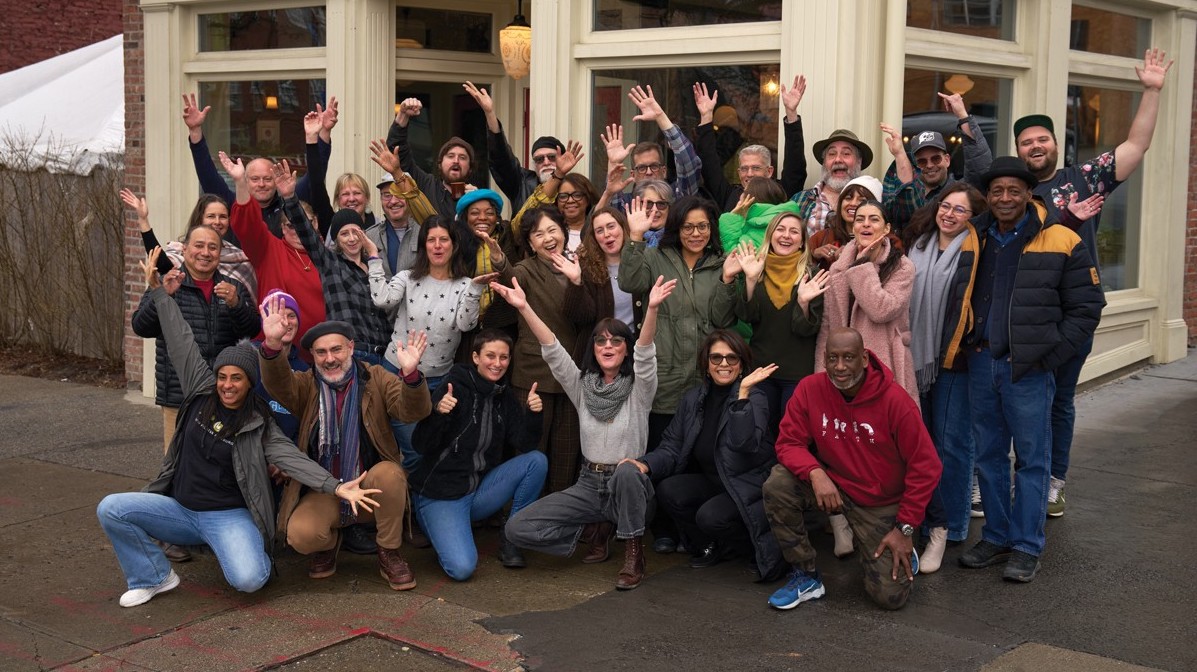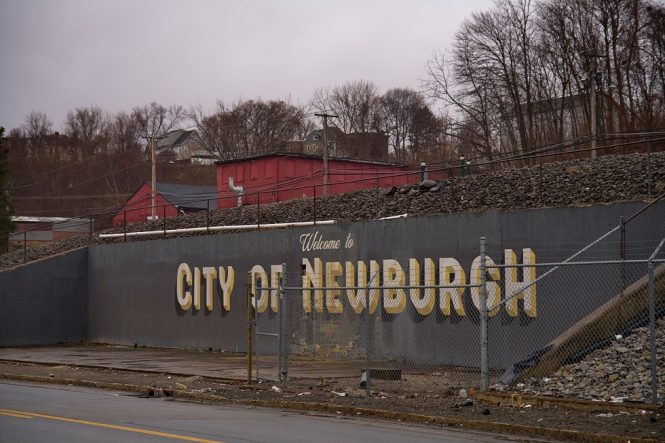Newburgh: A Real Resurgence
By Anne Pyburn Craig | Photos by David McIntyre | Spring 2024 | Community Spotlight
When Ramona Monteverde walked into the Hotel Newburgh for the first time, in 2002, she was stunned by the task that lay ahead. “I walked right back out and said ‘There’s no way this can work,” she recalls. “Then I went home and my partner said, ‘C’mon, you know you have to give it a chance.”
Two years later, Safe Harbors—the organization for which Monteverde serves as director of operations—got $21 million in funding and transformed the dilapidated, single-room occupancy hotel into supportive housing with a long list of amenities and programs. Monteverde, elected Ward 2 councilwoman in 2018, finds herself trying to help the city through an affordability crisis that led the council to declare a state of housing emergency late last year. “There’s a lot going on right now—every other street you drive down you see a building being rehabbed,” she says. “But even a shell of a building is now priced somewhere over $200,000 for a property that could cost you another half a million to renovate. My daughter and her fiance are looking to buy a home, and there’s just nothing attainable.”
Monteverde is hoping the housing emergency declaration will help protect tenants while affordable developments come to fruition, including the Kearney Group’s projects on Colden and Montgomery streets and Safe Harbors’ own latest effort, on William Street. “All of these projects take a couple of years to get through the permitting and financing process. Existing affordable housing has long waiting lists. Still, it’s finally happening—I just hope it doesn’t slow down. I hope developers continue to invest in Newburgh, and that we can keep figuring out how to keep people housed here, while also staying mindful of the environment and climate change.”
Just west of the city limit, in the Town of Newburgh, I-84 and I-87 converge just minutes away from Stewart International Airport, making for prime commercial real estate; as of 2022, there were 40 projects underway or planned. Last August, Tesla announced it would lease 927,000 square feet of brand-new warehouse space for a distribution center. New Jersey-based developer Matrix built that building and another on spec, citing logistical advantages and a strong local labor pool.
The Newburgh Scene
Newburgh-born chef Chuck Bivona came home in 2019 to handle family matters and stayed to partner with a longtime friend and open Bivona’s Simply Pasta, a handmade pasta shop and deli on Liberty Street’s resurgent Restaurant Row—where as soon as one restaurant closes another opens up.
“The unique culture of a community, the roots, is the draw—that’s why, say, Arthur Avenue in the Bronx is still bubbling after a century,” Bivona says. “As a sort of stepchild borough [of New York City], we get much of the same diverse, talented melting pot, and the result is entrepreneurial energy—Latin American, Black, European, a small but growing Asian presence. So we have bangin’ Jamaican jerk spots and Mexican sweets and ice cream, along with great Greek and Italian food, places like Torino Bakery and Newburgh Lunch, multigenerational success stories. G&H Deli just did a major remodel; it’s gorgeous. And there’s a diversity of thought—you can be politically passionate in whatever way, and somewhere in the greater Newburgh area you’ll find allies. But please, don’t come here thinking you have the magic recipe that will make Newburgh cool. Newburgh was never not cool.”

One of Newburgh’s many murals.
Sam Satanovsky owns Toasted, a restaurant and nightlife spot a few doors from Bivona’s. “I’ve never pretended to be from here. I came to a city I loved hanging out in because I thought I could make money here,” he says. “I’ve seen others come and go, and sincere community commitment will make or break you here.” Amid live music, comedy, and drag nights, Toasted reserves multiple nights a month for talented local youth.
“When we first arrived, this was a stretch of nothing but condemned buildings,” Satanovsky says. “Now, I come in on a Tuesday to take out the trash and there’s a line out the door at the pasta shop. There are so many people coming here, so many eyes on our city right now, and I think what we do in the next five years can stop the roller coaster ride and establish us as a solid destination going forward, but it’s going to take intelligent government.”
This spring, nightlife will be sparkling at both Toasted and the Silk Factory, a 1910 industrial space reimagined by Newburgh native Rich Fracasse into an elegant cafe and venue. On May 11, Newburgh Mercantile will host an urban outdoor art market, Art on the Block. A brand new independent bookstore founded by pandemic-era transplant Angie Venezia last fall, the Golden Hour Books, is named for the look of the city at sunset.
The Newburgh Real Estate Market
Sarah Beckham Hooff, broker/owner at ReAttached Real Estate, says that Hudson Valley locals and city transplants alike are drawn by Newburgh’s advantages: a compact, walkable, friendly city on a hill that protects against flooding issues. “Newburgh’s outdated reputation is fading, in part, because racism is going out of style,” she says. “There’s been a tremendous amount of investment here over the past 10 years, and the city’s doing a good job reorganizing. Money is being spent on roads and sewers, the credit rating has been improving. Over the next few years, there’s going to be a lot of new, high-quality housing created—some affordable, some artists’ lofts, some market rate, like the beautiful Lofts at The Foundry. You need all of those to balance things out.”
“We still have a lot of fixer-uppers, and homeowners are taking advantage of renovation loans and of changes to FHA guidelines that make it affordable to purchase buildings of up to four units, so you can live in one and rent the rest,” Hooff says. “And despite the pandemic boom, you can still find a renovated townhouse with river views for what you’d pay for a bland little cottage on a side street in, say, Beacon.”
At press time, there were fixer-uppers, some smaller bungalows and Colonials, and condos listed for under $250,000. Between $400,000 and $500,000, one could find multifamily properties, some brick gems, and ranches and Colonials on larger lots on the outskirts of town. An architect-built three-bedroom with deeded river access, high ceilings and generous patio and pool was on the market for just under $2,000,000.
